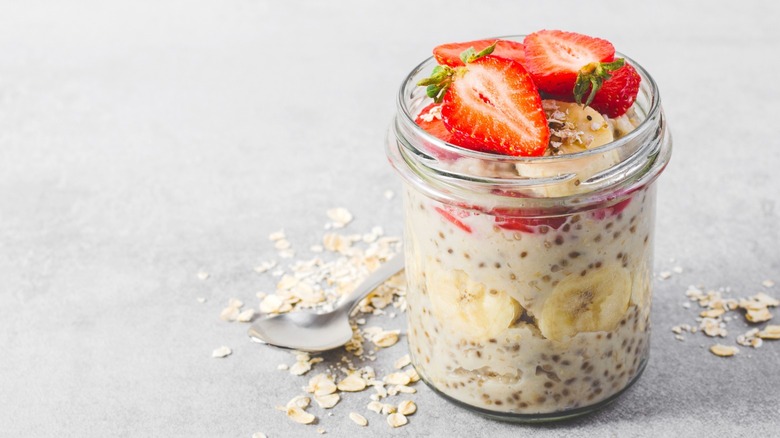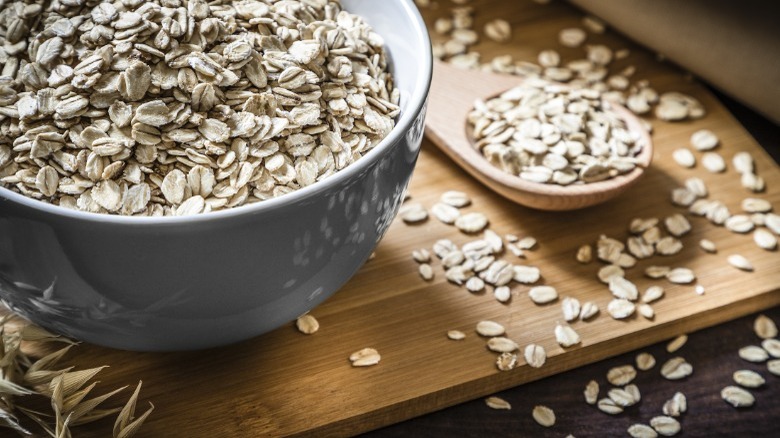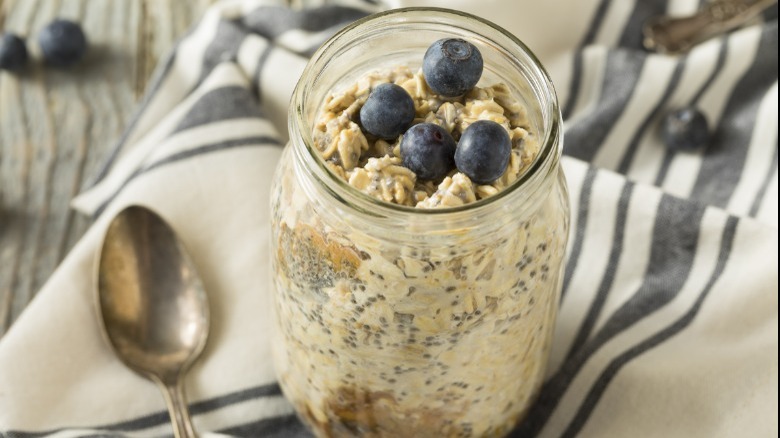The Best Type Of Oats To Use When Mixing Up Overnight Oats
Overnight oats are one of those perfect breakfasts you can prepare ahead of time to make your mornings much easier. The basic recipe requires only oats and milk, and the choice of add-ins is yours to influence the dish's final flavor. But does the type of oats you use matter when making this meal?
It turns out that the variety is more important than you might think. Your local grocery store likely offers an abundance of options near the granola or cereal aisle, but the best choice for overnight soaking is old-fashioned oats, also called rolled oats. This variety absorbs the liquid and becomes creamy, whereas quick oats or steel-cut oats may end up with a pasty or overly firm consistency.
Interestingly, quick oats are technically a subtype of rolled oats — but that doesn't mean you can substitute one for the other. The additional step that distinguishes old-fashioned oats is that they are flaked after being steamed and rolled. Quick oats are rolled thinner than classic rolled oats, and are soaked in water longer before the grain is rolled. These extra processing steps make a massive difference in the final product you'll get when crafting your breakfast, so it's crucial to pay attention to the variety you're picking off the shelves if you want the best texture results.
How your oats are processed matters
Most oats begin as groats, which is the term for oats in their most unprocessed form. Because they're unrefined, groats require a lengthy cooking time to soften. Steel-cut oats are groats that have been sliced into smaller pieces with a steel blade — and while they cook more quickly than groats, both options are too raw, and won't absorb your milk quickly enough to yield successful overnight oats. They'll likely still be tough and hard to digest, even after hours of soaking in the fridge.
Quick oats, on the other hand, are finely cut and rolled flat — they are essentially engineered to cook very fast. Because of their small size, quick oats soak up too much liquid, and get too mushy to create the ideal overnight oats texture.
Now, regarding the best oats for overnight oatmeal: Rolled oats also start as groats, which are then steamed and flattened with a rolling device. The rolled variety is commonly used in sweet recipes and is the best oat type for oatmeal cookies — but they're also the perfect option for overnight oats. The fact that they're rolled thin allows them to soften faster, but they're processed just the right amount to be able to soak up the liquid and become creamy without becoming too inundated — perfect for your next make-ahead breakfast.
Customize your overnight oats
Your classic overnight oats add-ins include things like peanut butter or fruit. But what if you lean towards more adventurous eating, and want to get really creative with your overnight oats? There are plenty of add-ins that venture beyond the traditional. If you're a fan of bubble tea and crave a significant texture contrast, give your oatmeal a texture boost with boba pearls. If you're seeking a caffeine kick with your morning meal, why not try matcha overnight oats? Experimenting with chia seeds is another option; they absorb water, swell up, and achieve a gel-like consistency.
Another way to play with the flavor of your overnight oats is to switch up the milk or sweetener you use. You can use both dairy-based and non-dairy milks like almond or coconut when making overnight oats, but keep in mind that oat, soy, and coconut milks will result in a thicker final product. If you prefer a thinner consistency, you can always add more milk before eating your oats in the morning. Adding fruit is a great way to introduce some natural sweetness to your oats, but if you want more variety, feel free to add sugar, honey, or maple syrup to taste.



